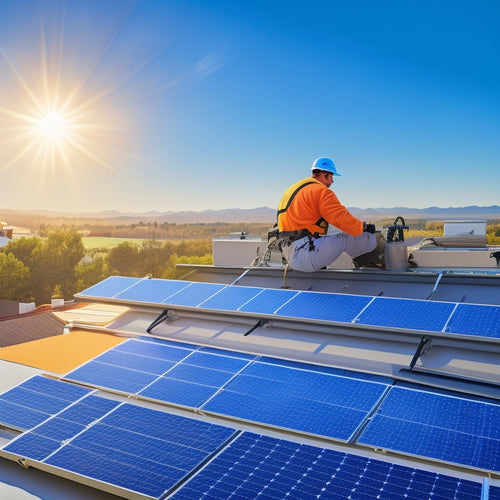
What Are the Best Low-Cost Solar Panels for Your Home
Share
You're now able to install high-quality solar panels at a fraction of the cost, thanks to significant price drops and attractive incentives that make renewable energy more accessible than ever. With top brands like Trina, Jinko, and Hanwha Q CELLS offering high-performance options at competitive prices, you can enjoy significant savings on your energy bills. When selecting a solar panel, consider factors like efficiency, durability, and warranty to guarantee you're getting the best value for your money. By considering these factors, you'll be well on your way to utilizing the power of solar energy without breaking the bank, and there's more to investigate in this expedition to renewable energy.
Key Takeaways
- Trina Solar's TALLMAX M10 and JA Solar's M10 modules offer high power outputs at competitive prices, making them affordable solar panel options.
- Hanwha Q CELLS' Q.PEAK DUO series combines affordability with high efficiency and durability, providing a cost-effective solution for homeowners.
- LONGi Solar's Hi-MO 4 series delivers high power density at an attractive price point, making it an affordable option for those looking to reduce energy bills.
- When selecting low-cost solar panels, it's crucial to evaluate warranty, efficiency, and durability to ensure the best value for your investment.
- Balancing efficiency and budget is key, as high-efficiency panels provide more energy but often come with higher price tags, while lower-cost panels may generate less energy over time.
Understanding Low-Cost Solar Options
Kick-start your expedition to utilizing renewable energy by grasping the fundamentals of low-cost solar options. As you investigate the world of solar power, you'll realize that low-cost solar panels can be a transformative solution for your home. The low cost benefits are undeniable, making it an attractive option for homeowners looking to reduce their carbon footprint without breaking the bank.
One of the primary advantages of low-cost solar options is the significant reduction in upfront costs. With prices dropping dramatically over the years, solar panels are now more accessible than ever. Additionally, solar incentives such as tax credits and rebates also sweeten the deal, making it an economically viable choice.
Moreover, low-cost solar panels are designed to provide a high return on investment, generating electricity at a lower cost than traditional sources.
When selecting low-cost solar options, it's crucial to evaluate factors such as panel efficiency, durability, and warranty. By doing your research and understanding the benefits and trade-offs, you can make an informed decision that meets your energy needs and budget.
Top Brands for Affordable Solar
You're likely looking for top solar panel makers that offer affordable options without compromising on quality.
Fortunately, several budget-friendly brands have risen to the challenge, providing reliable and efficient solar panels at competitive prices.
From established players to newer entrants, you'll find a range of brands that cater to different needs and budgets.
Top Solar Panel Makers
Reliability is key when it comes to utilizing the power of the sun, and that's where top solar panel makers come in. You want to guarantee that your solar panels perform at their best for years to come, and that's where the knowledge of reputable solar panel manufacturers comes into play.
The market competition is fierce, with numerous companies vying for your attention. However, only a handful of top solar panel makers have proven themselves to be consistently reliable and efficient.
When selecting a solar panel brand, you should look for manufacturers that have a strong track record of innovation, quality control, and customer support. These brands have invested heavily in research and development, resulting in advanced technology that maximizes energy output while minimizing costs.
Top solar panel makers like Trina, Jinko, and Hanwha Q CELLS have established themselves as industry leaders, offering high-performance solar panels that meet international standards.
Affordable Options Available
Several top-tier solar panel brands offer high-quality, affordable options for homeowners looking to switch to renewable energy. You'll find that these brands employ cost-effective materials to minimize upfront costs without compromising on efficiency.
For instance, Trina Solar's TALLMAX M10 and JA Solar's M10 modules boast high power outputs at competitive prices.
Hanwha Q CELLS' Q.PEAK DUO series is another affordable option that offers high efficiency and durability. These panels are designed to provide long-term savings through reduced energy bills and minimized maintenance.
You can also consider LONGi Solar's Hi-MO 4 series, which offers high power density and reliable performance at an affordable price point.
When evaluating these options, consider factors like warranty, efficiency, and durability to guarantee you're getting the best value for your money.
Budget-Friendly Brands Rise
As homeowners increasingly prioritize renewable energy, budget-friendly brands are rising to meet the demand. You're no longer limited to expensive solar panels from well-known manufacturers. Emerging technologies and market trends have led to the emergence of affordable options that don't compromise on quality.
| Brand | Price Range (per watt) |
|---|---|
| Trina Solar | $0.25 - $0.35 |
| Jinko Solar | $0.28 - $0.38 |
| Canadian Solar | $0.30 - $0.40 |
| Hanwha Q CELLS | $0.32 - $0.42 |
| LONGi Solar | $0.35 - $0.45 |
These brands offer high-efficiency solar panels at competitive prices, making solar energy more accessible to homeowners like you. With prices ranging from $0.25 to $0.45 per watt, they're an attractive option for those looking to reduce their carbon footprint without breaking the bank. By choosing a budget-friendly brand, you can enjoy the benefits of solar energy while staying within your budget.
Efficiency Vs Cost Trade-Off
You're likely aware that high-efficiency solar panels come at a higher cost, but you may not know that lower-cost options typically sacrifice some efficiency.
As you weigh your options, you'll need to balance your desire for maximum energy production against your budget constraints.
High Efficiency Costs More
Your wallet might be pleased with a solar panel's low upfront cost, but it's vital to evaluate the long-term implications of opting for a cheaper, less efficient model. While a lower-priced option might seem appealing, it's important to take into account the trade-off between efficiency and cost.
| Efficiency | Cost |
|---|---|
| High (20%) | Higher upfront cost, but more energy generated per unit area, resulting in faster energy conservation and potential for better solar financing options |
| Medium (15%) | Balanced cost and efficiency, providing a reasonable return on investment |
| Low (10%) | Lower upfront cost, but reduced energy output, potentially affecting energy conservation and solar financing options |
High-efficiency solar panels might come with a higher price tag, but they can generate more energy per unit area, leading to faster energy conservation and potentially better solar financing options. On the other hand, lower-efficiency panels may be more affordable upfront, but they might not provide the same level of energy output, which can impact your energy conservation goals and solar financing options. It's important to weigh these factors carefully to make an informed decision that meets your energy needs and budget.
Lower Cost Means Less
Pinning your hopes on a low-cost solar panel might seem like a smart move upfront, but it's vital to take into account the long-term consequences of sacrificing efficiency for cost.
When you opt for cheaper solar panels, you're likely to get lower performance metrics, which can impact your overall energy generation and long-term savings.
Here are 3 key areas where lower cost solar panels fall short:
-
Energy Output: Less efficient panels produce less electricity per hour of sunlight, resulting in lower overall energy output.
-
Durability: Cheaper panels may have a shorter lifespan, requiring more frequent replacements and increasing maintenance costs.
-
Performance in Low-Light Conditions: Lower-cost panels often struggle to perform well in low-light conditions, such as during winter months or in areas with frequent cloud cover.
While the initial cost savings may be enticing, it's important to reflect on the long-term implications of choosing lower-cost solar panels.
Balancing Efficiency Budget
When it comes to selecting the ideal solar panel for your home, a delicate balance must be struck between efficiency and cost. You want to maximize your energy savings, but you also need to take into account the upfront cost of the panels. High-efficiency panels may provide more energy per unit area, but they often come at a higher price point.
On the other hand, lower-cost panels may be more budget-friendly, but they mightn't generate as much energy. To achieve cost effectiveness, you'll need to find a sweet spot between these two factors.
Look for panels with a high efficiency rating (measured in percentage) that also fit within your budget. A higher efficiency rating doesn't always mean a higher cost, so be sure to research and compare different options.
Additionally, take into account the overall energy savings you'll achieve with a particular panel, rather than just focusing on the upfront cost. By balancing efficiency and cost, you can find the perfect solar panel for your home that provides both energy savings and a strong return on investment.
Durability and Warranty Matters
Most solar panels are designed to last for at least two decades, but the best ones can withstand harsh weather conditions and maintain their efficiency for up to three decades or more.
You want solar panels that can provide long-term performance, and that's where material quality comes in.
When evaluating durability, consider the following key factors:
- Frame durability: A sturdy frame can withstand strong winds and heavy snow loads.
- Glass or protective layer: A high-quality glass or protective layer can resist scratches and cracks.
- Weather-resistant connections: Sealed connections can prevent water and moisture from seeping in.
A thorough warranty can provide peace of mind, covering you against defects, performance degradation, and other issues.
Look for manufacturers that offer warranties of 25 years or more for both the product and performance. A longer warranty period indicates the manufacturer's confidence in their product's durability and performance.
Installation Costs and Savings
Since you've secured durable and warranty-backed solar panels, it's time to reflect on the financial aspects of going solar.
When calculating installation costs, you'll need to take into account the system size, labor expenses, and additional components like inverters and mounting hardware. On average, homeowners pay between $2.50 and $3.50 per watt, with a typical residential system ranging from 5 to 20 kilowatts.
To optimize installation savings, it's essential to choose a reputable installer who can provide accurate cost forecasts. Look for companies that offer detailed quotes, including a breakdown of equipment and labor costs.
Additionally, think about the long-term benefits of going solar, such as reduced energy bills and potential increases in your property value. By carefully evaluating installation costs and savings, you can make an informed decision that aligns with your energy goals and budget.
Government Incentives and Rebates
The federal government and various state governments offer attractive incentives to encourage homeowners to switch to solar energy. These incentives can greatly reduce the cost of installing solar panels, making it more affordable for you to utilize the power of the sun.
You can benefit from the following government incentives:
-
Federal Tax Credits: Claim up to 26% of your total solar panel installation cost as a tax credit.
-
State Incentives: Take advantage of state-specific rebates, tax credits, and exemptions that can further reduce your installation cost.
-
Local Programs: Investigate financing options, installation grants, and community solar programs offered by your local government or utility company.
These incentives can help you save money on your energy bills while also contributing to environmental benefits.
Additionally, many states and local governments offer financing options, such as low-interest loans or property tax exemptions, to make solar energy more accessible.
DIY Solar Panel Installation
Taking into account the cost savings of government incentives, you may be wondering if installing solar panels yourself can further reduce expenses. While DIY solar panel installation can be a cost-effective option, it's important to evaluate the pros and cons before taking on the task.
On the plus side, you'll save on labor costs, which can account for up to 30% of the total installation cost. However, you'll need to invest time and effort into researching and preparing for the installation.
To guarantee a successful DIY installation, it's vital to follow proper safety protocols and adhere to local building codes. You'll also need to take into account solar panel maintenance, as improper installation can lead to reduced system efficiency and lifespan.
DIY installation tips include confirming a secure and watertight mounting system, correctly connecting electrical components, and performing regular system checks. Additionally, think about consulting with a professional to verify your system meets local building codes and is eligible for government incentives.
With careful planning and execution, a DIY solar panel installation can be a cost-effective and enabling way to utilize the power of the sun.
Best Value Solar Panels Today
With your DIY installation plans in place, it's essential to choose the right solar panels to guarantee you're getting the most value out of your investment.
You want solar panels that will provide you with maximum energy savings without breaking the bank.
Here are the best value solar panels on the market today:
- Trina Solar TALLMAX M10: Offers high-efficiency rates of up to 21.9% and a competitive price point.
- Jinko Solar Cheetah 410W: Boasts a high power output of 410W and an impressive temperature coefficient of -0.39%/°C.
- Hanwha Q CELLS Q.PEAK DUO-G9: Features a high-efficiency rate of up to 20.6% and a 25-year warranty.
When making solar panel comparisons, consider factors like efficiency rates, power output, and warranty periods to ascertain you're getting the best value for your money.
Frequently Asked Questions
Do Solar Panels Work During Power Outages?
When the grid goes dark, you're left in the dark, but your solar panels don't have to be. During power outages, you can still capture the sun's energy with a battery backup system, ensuring your solar panel efficiency isn't lost, and you have reliable power outage solutions.
Can I Finance My Solar Panel Installation?
You can finance your solar panel installation using various solar financing options, such as solar loans, which offer benefits like low interest rates, flexible repayment terms, and tax incentives, making it easier to power your home sustainably.
How Do I Clean and Maintain Solar Panels?
As you gaze up at your solar panel array, imagine a sparkling clean surface utilizing the sun's energy. To keep it that way, you'll use gentle cleaning techniques and follow maintenance tips like regular inspections and debris removal to guarantee peak energy production.
Do Solar Panels Increase My Home's Value?
You'll be pleased to know that installing solar panels can enhance your home's value by up to 17%, thanks to the solar panel benefits like home energy savings, which attract potential buyers and increase your property's appeal.
Can I Add More Panels to My Existing System?
Carefully consider compatibility cues when adding more panels to your existing setup, ensuring seamless integration with your original system. You'll need to scrutinize installation considerations, such as wiring and inverter capacities, to power up efficiently.
Related Posts
-

Top 10 Tips for Buying Car Accessories Online
When purchasing car accessories online, you should take proactive steps to avoid low-quality or incompatible products...
-

3 Best State and Local Solar Incentives USA
You can greatly reduce your energy dependence and save thousands of dollars by taking advantage of the top state and ...
-

3 Essential Steps for Solar Electricity Installation
To guarantee a successful solar electricity installation, you'll need to follow three essential steps. First, assess ...


